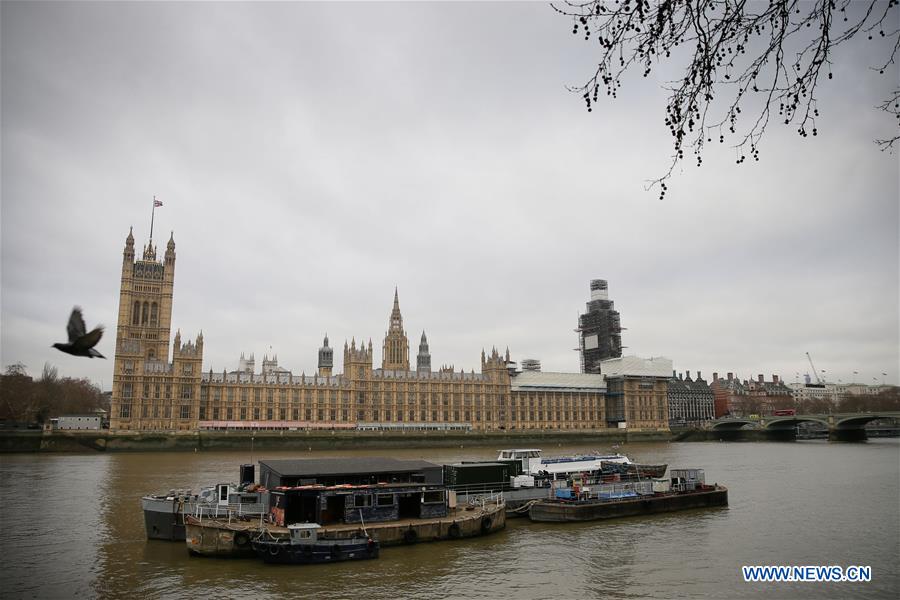
Photo taken on Jan. 7. 2019 shows the Houses of Parliament in London, Britain. MPs returned to Westminster Monday after the festive and new year break, and will resume debate on the Brexit bill on Wednesday, with the crucial vote expected in the early part of the following week. (Xinhua/Tim Ireland)
LONDON, Jan. 9 (Xinhua) -- As MPs in Britain's House of Commons resumed their marathon debate Wednesday on Theresa May's strongly opposed Brexit bill, nobody could predict what the eventual outcome will be.
Britain's prime minister is insisting that just two options are on offer: the deal she had brokered with leaders of the 27 member states of the European Union, or no deal.
Even the historic defeat for May in the House of Commons Tuesday, when politicians from all parties backed a move aimed at blocking a no deal, has so far failed to change May's resolve.
She repeated that resolve during a noisy Prime Minister's Question Time in the House of Commons, telling the main opposition leader, Labour's Jeremy Corbyn, and other MPs that the best way to avert a no-deal Brexit was to vote for her deal.
May and her negotiators held talks during the New Year recess with various EU leaders aimed at winning more assurances about the major stumbling block to the deal, the fate of the land border between Northern Ireland and the neighboring Irish Republic.
During question time on Wednesday, Corbyn asked May whether she had won legal guarantees to prevent a so-called backstop that would, if implemented, tie Northern Ireland to EU rules to avoid a border being created.
He said: "The prime minister scrapped the Brexit vote last month, and promised that legally binding assurances would be secured at the December EU summit -- she failed. She pledged to get these changes over the recess -- she failed. Is the prime minister not bringing back exactly the same deal that she admitted would be defeated four weeks ago?"
May said more details of assurances she had won, along with the results of continuing talks, would be given during the Brexit bill debate.
She told Corbyn: "The conclusions of the December European Council went further than before in seeking to address the concerns of this house, and they have legal status. I have been in contact with European leaders since then about MPs' concerns. These discussions have shown that further clarification on the backstop is possible, and those talks will continue over the next few days."
The big crunch will come next Tuesday night when, after five days of lengthy debate, MPs will finally get the chance to vote on May's deal.
They should have voted last month, but the vote was deferred when it became clear May would lose by a massive margin of between 100 and 200 votes.
Conservative managers have held behind-the-scenes talks with MPs over the past few weeks to win over opponents to her deal.
And while many politicians and commentators still expect May to lose on Tuesday, it is expected to be by a smaller margin.
If she does lose the vote on Tuesday, May will have the opportunity to return to the House of Commons later.
Under normal rules, she would have had 21 days, but former Attorney General Dominic Grieve won backing in the House of Commons Wednesday to require May to return to the Commons within three days.
His urgent amendment won by 308 votes to 297, another blow for May and her negotiators.
The main opposition Labour Party gave its closest indication so far on Wednesday when Barry Gardiner, the party's shadow international trade secretary, said that Labour leader Jeremy Corbyn could table a vote of no confidence in May's government if, as now widely expected, her Brexit deal is rejected by MPs on Tuesday.
If May loses the crucial vote it seems likely she will return to Westminster with alternative wording in the hope of winning support. Some commentators have suggested May could do this several times before she is left with the no-deal outcome.
May is likely to survive a vote of no confidence in the country as both remain and leave supporting Conservative MPs, as well as the Democratic Unionist Party, are likely to rally around the government. Their big fear will be opening the door to a Corbyn-led Labour government if May's government collapses.
With the EU departure date fast approaching, other options open to May could be to seek an extension to the two-year Article 50 period beyond March 29, when Britain is scheduled to end its 46-year membership of the EU. An extension would give more time to find a breakthrough.
The complication for both sides is that EU elections are due to take place later this year in the remaining 27 member states of the bloc.
If May runs out of options, it is also possible she herself could seek a general election, or even agree to allowing the British people to decide the issue in a second referendum.
As May herself said a few weeks ago, rejection of her deal will plunge Britain into uncharted waters.











